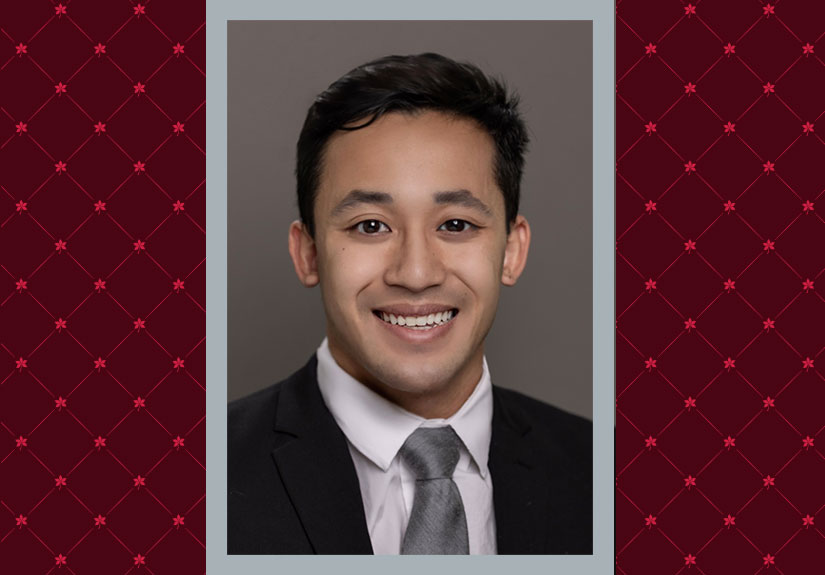Public Health Buckeyes: Eric Sette
MBA-MHA student combines passions for business, health care

Meet Eric Sette, a third-year student in the dual MBA-MHA program with the Fisher College of Business. After completing a pre-med-track bachelor’s degree in biology from Ohio State in 2020, Sette decided he was interested in addressing the complexity of health needs beyond individual patient care.
Question and Answer
Why did you decide to pursue both a Master of Business Administration and Master of Health Administration?
I aimed to learn how policies and systems can best promote the health and well-being of communities at a larger scale, and I believed an MBA-MHA dual degree from The Ohio State University would best enable me to question, explore and improve the structure, provision and financing of health care systems. While an MHA provides health care-specific education, an MBA provides a comprehensive foundation in business skills. The dual-degree combination allows versatility to work across multiple industries and functions.
What’s your favorite part about the MHA program?
My fellow students and the faculty. As a nationally ranked program, Ohio State continues to attract thoughtful, genuine and talented people, who I am now lucky to have as lifelong friends.
What are your goals after graduating?
My goal is to improve health care markets and systems, with a focus on access to cost-effective, equitable health care. I aim to work in management consulting or finance, which will hopefully lead to executive leadership roles such as CFO at a health system or a partner at a firm.
Are you involved in any extracurricular activities? If so, how have these experiences enriched your time at Ohio State?
I work as a graduate research associate at the James Cancer Hospital and Solove Research Institute with Dr. Elizabeth K. Arthur. Our research focuses on addressing cancer health disparities through community advocacy, specializing in cancer survivorship and supportive care in oncology. It’s been impactful to see firsthand the persistent barriers to equitable care, and the importance of leveraging community members to inform appropriate interventions and to improve a more culturally sensitive model of cancer care.
Last year, I completed an administrative residency at the Ohio State Wexner Medical Center University Hospital and the Richard M. Ross Heart Hospital under the fantastic mentorship of Dennis Delisle. This summer, I’m working as a senior finance manager intern at the Procter & Gamble Company in their Global Oral Care Ventures. These professional experiences have enabled me to contextualize and apply classroom learning in a practical way, while making tangible impacts in the field and community.
I’ve also had the honor to serve on various student organization boards, including the Association for Future Healthcare Executives, Fisher Healthcare Association, Fisher Consulting and Strategy Club and Students Consulting for Nonprofit Organizations. These leadership positions have allowed me to invest in the professional growth and development of first-year students.
My favorite experiences in graduate school have been case competitions, where teams compete to create a solution to a business case study or real-life issues. Past involvements include: NAHSE Everett V. Fox Student Case Competition, Deloitte National Supply Chain & Network Operations Challenge, the UCLA Healthcare Management Case Competition, and most recently the Ohio State College of Public Health Case Competition.
What advice would you give students considering pursuing an MHA?
Figure out what your non-negotiables are — whether it be exercise, eating a good lunch, a phone call with a family member, sleep, going for a run, or, for me personally, playing the piano. Finding time for the things that make you who you are gives you energy to be efficient, effective and engaged. There will always be another hour of studying, another networking call, so purposefully block time for things that matter most.
Next, build a support team who believes in you and challenges you to grow. Be open to opportunities, as a graduate school is a safe environment to discover new interests and take risks, knowing you have a whole team of faculty, peers, mentors and family to cheer you along the way. For example, a group of MHA students and I ran the OhioHealth Half-Marathon last spring!
Finally, as a professional program, remember that your classmates will be your network post-graduation. Be someone who people would want to work with again.
What do you hope for the future of public health?
An appreciation for its profound impact and vital role in society, as evident by the pandemic. Hopefully, this leads to increased funding for public health initiatives. Further, I hope public health continues to place the needs of the communities and individuals at the forefront through community-based participatory research, increased representation in governance structures and decision-making, and innovative cross-sector collaborations built upon trust, empathy and compassion.
About The Ohio State University College of Public Health
The Ohio State University College of Public Health is a leader in educating students, creating new knowledge through research, and improving the livelihoods and well-being of people in Ohio and beyond. The College's divisions include biostatistics, environmental health sciences, epidemiology, health behavior and health promotion, and health services management and policy. It is ranked 22nd among all colleges and programs of public health in the nation, and first in Ohio, by U.S. News and World Report. Its specialty programs are also considered among the best in the country. The MHA program is ranked 5th and the health policy and management specialty is ranked 21st.